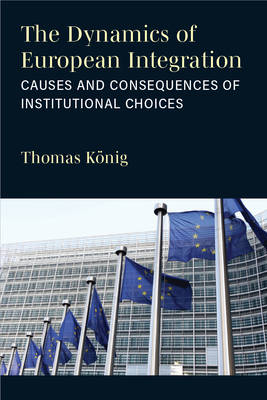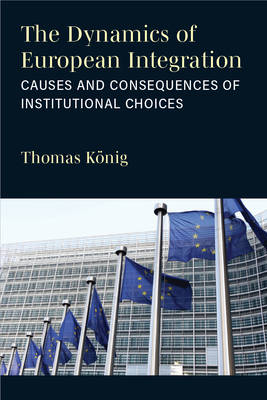
- Afhalen na 1 uur in een winkel met voorraad
- Gratis thuislevering in België vanaf € 30
- Ruim aanbod met 7 miljoen producten
- Afhalen na 1 uur in een winkel met voorraad
- Gratis thuislevering in België vanaf € 30
- Ruim aanbod met 7 miljoen producten
Zoeken
The Dynamics of European Integration
Causes and Consequences of Institutional Choices
Thomas König
Paperback | Engels
€ 35,45
+ 70 punten
Omschrijving
In Europe's recent history, there have been several challenges to the strength of the European Union--Brexit, COVID, financial crises, and global tensions--bringing an increased need to understand the ways that the European Union (EU) could successfully stay together or fall apart. In examining how the European Union has changed since 1993, important puzzles have emerged, including how national government functions are transferred to the EU without reforming the EU, how increased transparency is announced while decisions are approved in informal meetings, and how the effects of the polarizing rise of Euroscepticism can be managed to still promote the formation of solidarity and trust among Europeans. To understand these puzzles, Thomas König introduces a new theory of (supra)national partyism to help explain the causes and consequences of choices made by political leaders for Europe. He uses a game-theoretical perspective to look at how conditions for leaders change through accessions of new members, shocks, and crises, and separates institutional choices into two different games played by office- and policy-seeking political leaders--the interstate summit game and the national game of party competition. The Dynamics of European Integration reveals how the reorganization of electoral systems can harness dissensus and polarization among diverse national constituencies to enable the promotion of solidarity and trust in the EU.
Specificaties
Betrokkenen
- Auteur(s):
- Uitgeverij:
Inhoud
- Aantal bladzijden:
- 220
- Taal:
- Engels
Eigenschappen
- Productcode (EAN):
- 9780472039685
- Verschijningsdatum:
- 2/05/2024
- Uitvoering:
- Paperback
- Formaat:
- Trade paperback (VS)
- Afmetingen:
- 147 mm x 221 mm
- Gewicht:
- 294 g

Alleen bij Standaard Boekhandel
+ 70 punten op je klantenkaart van Standaard Boekhandel
Beoordelingen
We publiceren alleen reviews die voldoen aan de voorwaarden voor reviews. Bekijk onze voorwaarden voor reviews.











